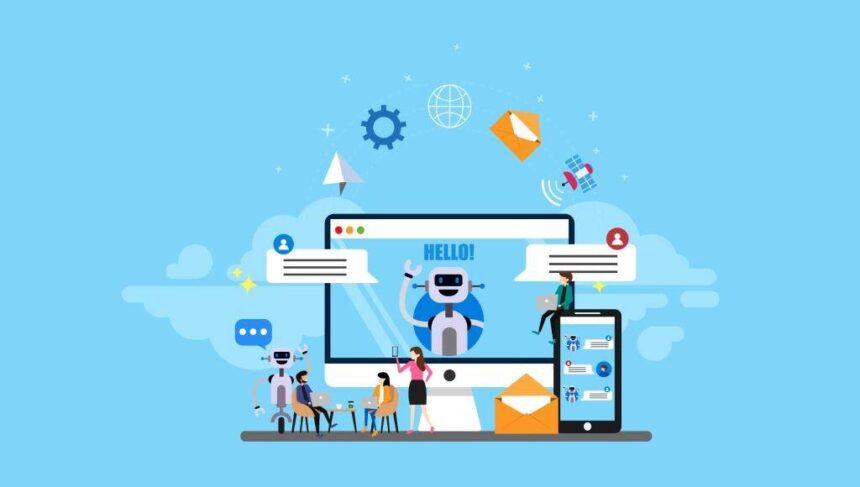Artificial intelligence is intended to mimic the behavior of humans. However, AI technology can be applied in reverse – it can be used to change human behavior. There are a number of reasons AI can be great for social engineering, especially in the field of marketing.
Julita Vassileva, a Professor at the University of Saskatchewan in Canada wrote a great paper on AI for Human Learning and Behavior. This paper was published in Frontiers in Artificial Intelligence Journal. Vassileva pointed out that there are numerous applications of AI for behavior changes.
Most of her paper focused on using AI to help people overcome addictions and other problematic habits. However, there are plenty of ways to use AI to change behavior for marketing as well.
Andrew Stephen talked about the role of AI in behavioral marketing in greater detail in his article on Forbes. He points out that this is a seemingly new field, but older technology has accomplished similar results for a long time.
“We are still in the early days of AI’s influence on consumer behavior, but the pace of chance moving forward will be rapid. One of the challenges on the consumer side is that most of us are still not fully comfortable handing over human agency, i.e., our need to make decisions, to machines.”
Role of AI in Behavioral Change Marketing
There are some tribes of experts that believe AI-driven marketing contributes to some of the biggest problems our society faces. This could be consumerism, exclusion and outdated values. The truth is, artificial intelligence in marketing can also be responsible for a number of great campaigns that nurture behavior change, and ultimately establish a new set of beliefs surrounding an issue that is critical to our society. Division has never been more prevalent in today’s society, and so the integral role of behavior change marketing cannot be undersold, whichever side of the debate you fall on. Let’s review what this looks like and how it can promote change in the present and future with artificial intelligence in marketing.
Prompting social change
McKinsey wrote a great piece on the applications of AI with social change. This can intersect with the marketing profession.
Each of us acts and coexist under the proviso that the rest of society share the same good intentions and prevailing values. This is obviously not true, and how can it be with all individuals being raised and conditioned to believe the narrative that fits their reality? This is where behavior change marketing can get to the root of a problem and change the narrative and then make the message memorable and visible. A great example of this is the ‘Respect Women: Call It Out’ campaign, which involves a group of office working men, one of which is talking down to his female partner on the phone, only to be ‘called out’ by his peer. Bringing issues to light that may take place in the public or private sphere makes marketing an integral component in the behavior change movement.
Health re-education
AI is becoming more important in the field of healthcare. One of the biggest applications comes with re-education.
In generations gone by, there have been huge amounts of money that have been sunk into the advertising of unhealthy food. It’s only been in the modern era that governments, public and private groups have started to re-educate society on the benefits of a healthy, balanced lifestyle. Australia launched the ‘2 Fruit & 5 Veg’ campaign and it has long stayed in the psyche of Australians, with regular ads and outdoor advertising pulsing throughout the years to strengthen the message. While some may only recall the spinoff campaigns, they center around the same powerful, yet simple, message. The United Kingdom had a similarly successful ‘5 A Day’ campaign, which has also provided a pillar of health education across the country.
Environmental impacts
Beyond social responsibility comes the environmental, which poses a real opportunity for behavior change marketing to instigate some change. There would have been a time where you couldn’t know how business conducted their operation on an environmental scale, and you probably never thought to ask. The 21st century has turned this ignorance on its head, with brands radically changing the ethics of their business, and putting those changes front and center for customers and clients to approve of and respect. Behavior change marketing has created this value-driven market, where customers first ask where something has come from and how before they purchase. A number of new AI education campaigns are helping people focus more on the environment.
Advocacy
Whether you are left or right, some successful behavior change campaigns have been working towards the united goal in having individuals register to vote. Australia’s same-sex plebiscite featured emotive ‘Yes’ and ‘No’ campaign ads, with an adjacent prevailing message being that all Australian’s had to make sure they had registered to vote in the plebiscite. The United Kingdom is facing a similar advocacy effort, with global campaigns reminding UK citizens living abroad to register to vote in the Brexit debate. Portraying this message in an emotive and national angle has turned this direction from instruction to intention.
Marketing bridges the gap in cultures and communities, presenting a mass media message that has been carefully created to serve a beneficial outcome. Without marketing, these behavior changes would only remain theories and anecdotes, failing to be visible to those who may need to hear and enact the message.
AI is Changing the Field of Behavior Marketing
Behavior marketing is evolving as AI becomes more pivotal in our daily lives. A growing number of companies are using artificial intelligence to facilitate these changes to make marketing more feasible.

